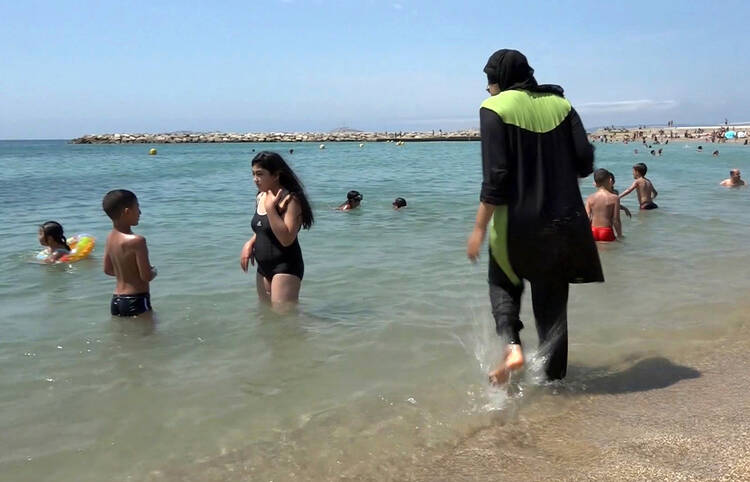France's highest administrative authority is studying whether local bans on full-body burkini swimsuits are legal, amid growing concerns in the country and abroad about police forcing Muslim women to disrobe.
Images of uniformed police appearing to require a woman to take off her tunic, and media accounts of similar incidents, have elicited shock and anger online this week.
Some fear that burkini bans in several French towns, based on a strict application of French secularism policies, are worsening religious tensions. Divisions have emerged in President Francois Hollande's government over the bans, and protests have been held in London and Berlin by those defending women's right to wear what they want on the beach.
Critics of the local decrees have said the orders are too vague, prompting local police officials to fine even women wearing the traditional Islamic headscarf and the hijab but not burkinis. The bans do not generally use the word "burkini" but forbid in a general way clothing that is ostentatiously religious.
Prime Minister Manuel Valls said on BFM television Thursday that burkinis represent the "enslavement of women" and reiterated support for the bans—but urged police to implement the bans fairly and respectfully.
Two human rights groups, arguing the bans are discriminatory, appealed to the Council of State.
The council held a hearing Thursday and is expected to issue a ruling on Friday. The ruling specifically concerns a ban in the Riviera town of Villeneuve-Loubet, but the decision will be binding and set a legal precedent on the increasingly heated question of whether cities can tell Muslim women what to wear on the beach.
The Human Rights League and the Collective Against Islamophobia in France say the Villeneuve-Loubet mayor's decree violates basic freedoms of dress, religious expression and movement.
The president himself has remained cautious on the issue, which reflects a long-running debate about France's century-old separation of church and state and its model of integrating immigrants from former colonies. Hollande said Thursday that life in society "presumes that each person conforms to the rules, and that there is neither provocation nor stigmatization."
Education Minister Najat Vallaud-Belkacem, a feminist with North African roots, said that while she doesn't like the burkini swimsuit, bans of the garment are politically driven and unleashing racist sentiment. Health Minister Marisol Touraine took a similar stance.
"My dream of society is a society where women are free and proud of their bodies," Vallaud-Belkacem said on Europe-1 radio. But with tensions in France high after a series of deadly Islamic extremist attacks, she said, "We shouldn't add oil to the fire" by banning burkinis.
In London, about 30 demonstrators threw a "wear what you want" beach party outside the French Embassy on Thursday to protest the bans.
Whatever the reason behind the ban, it doesn't justify "men with weapons standing over a woman telling her what not to wear. That's not a sight that any of us should stand for," said demonstrator Jenny Dawkins, 40, a curate at All Saints Church in Peckham.
The Villeneuve-Loubet order bars from local beaches anyone whose garments don't respect the principles of secularism, health and safety rules and good moral standards.
The conservative mayor in Villeneuve-Loubet, Lionnel Luca, has said he wanted to foresee any disruption to public order in a region badly hurt by the deadly Bastille Day truck attack in nearby Nice last month. The two towns are only 15 kilometers (9 miles) apart.
On Monday, a lower court in Nice ruled that the Villeneuve-Loubet ban was "necessary, appropriate and proportionate." The administrative court added that wearing "conspicuous" religious clothing on the beach may be seen as a "provocation" by some people and increase local tensions.
The Nice court also said that burkinis can be viewed as an "expression of an erasing" of women and "a lowering of their place which is not consistent with their status in a democratic society."
Religious clothing is particularly sensitive in France, where an unusually large part of the population has no religious affiliation, and where the first provision in the constitution says France is a "secular Republic."








